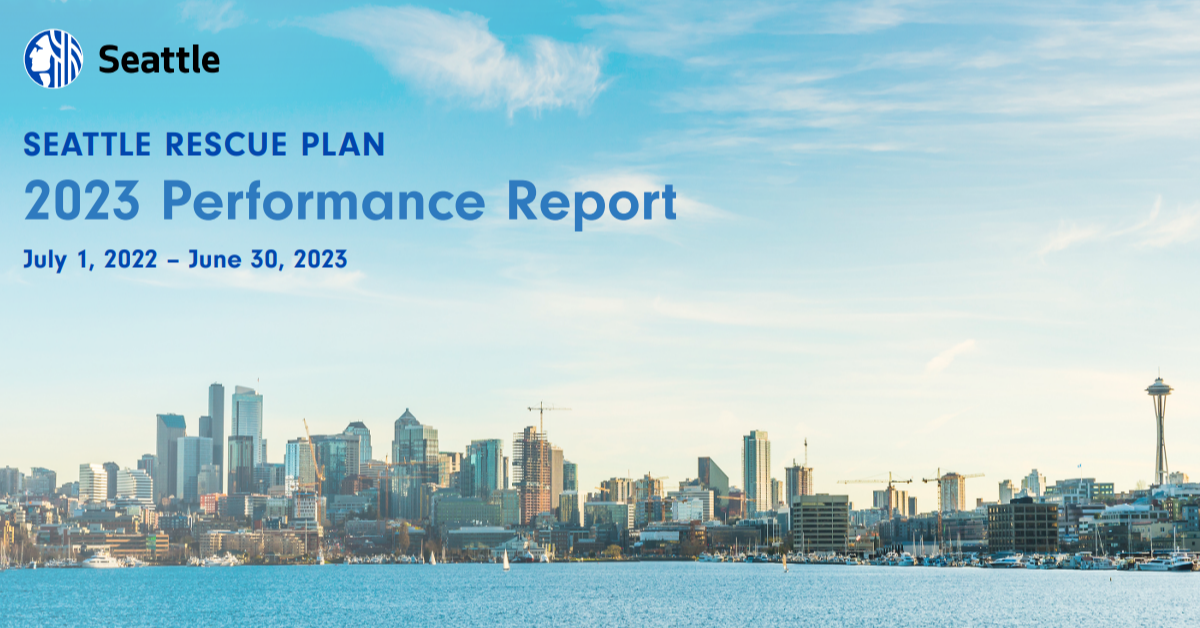
Seattle’s investments of $300 million in federal funding created new affordable housing, revitalized neighborhoods, and prioritized communities hit hardest by the pandemic
Seattle – Today, Mayor Bruce Harrell released Seattle’s latest performance report on how the City’s COVID-19 response programs are helping residents recover from the pandemic. The report highlights accomplishments across 35 programs with new performance data from 2022-2023 and exemplifies Mayor Harrell’s One Seattle commitment to performance evaluation and data transparency.
“The historic infusion of $300 million in federal aid through the American Rescue Plan Act and other legislation has been an opportunity to rebuild towards a more equitable vision for our future,” said Mayor Bruce Harrell. “As we continue to see improvements in safety, foot traffic, small business, and the return of major events back to Seattle, we are seeing impacts of our recovery investments at work. Seattle has been recognized as a leader in performance and evaluation, and we will continue to move forward by learning the best lessons from the pandemic and our response.”
Seattle funded over 350 community organizations and non-profits through the Seattle Rescue Plan. The City and its community partners have delivered a wide range of services, including the following achievements:
- Purchased four buildings that will offer 445 new affordable housing units
- Provided services to over 3,500 small businesses and grants to over 50 business associations
- Funded over 300,000 meals and supported an additional 1,000,000 food bank visits
- Supported public events that saw over 700,000 attendees
- Provided free childcare for 690 children and awarded funding to projects that will provide childcare services for an additional 311 children
- Supported over 800 Seattle Promise scholars to complete or re-start their college education
- Collected over 3.2 million pounds of litter and cleaned 100,000 square feet of graffiti
- Invested $3 million in downtown revitalization to bolster our region’s economic engine
More achievements are detailed on the Seattle Rescue Plan Transparency Portal and in the 2023 Seattle Rescue Plan Performance Report.
Seattle used federal funding to ramp up existing programs during the COVID-19 crisis, allowing City departments to meet the urgent and growing needs of residents disproportionately impacted by the pandemic. This funding also allowed for the creation and implementation of 17 new programs, some of which are innovative, pilot programs that have already been expanded beyond the pilot phase. For example, Seattle Restored began as a pilot program connecting small businesses and artists with vacant commercial space in Downtown Seattle. This program has since been expanded as part of Mayor Harrell’s Downtown Action Plan.
This funding has allowed the City of Seattle and its many partners to provide aid to communities disproportionately harmed by the pandemic, promote economic recovery, revitalize neighborhoods, and address inequities by supporting creative industries, small businesses, non-profits, and families. Across all programs with demographic data available, 60% of the people served by recovery funding identified as Black, Indigenous, and people of color.
Seattle has been a leader in quickly allocating federal relief funding where it was needed most, having spent 75% of the funds by April 2023. Out of the 75 Seattle Rescue Plan-funded programs, 18 are already complete while 57 are still ongoing.
To help manage the influx of $300 million in federal funding, Seattle invested in staff to evaluate the success of COVID-19 recovery programs and build capacity in the City and the community for standardized data collection and performance evaluation. In addition to leading trainings for City staff, the Measurement and Evaluation Team has worked with over 50 different community organizations to help make meaningful data collection more feasible. These improved practices led to an increase in the number of programs collecting meaningful demographic data, from 52% in last year’s report to 71% in the 2023 report.
The evaluation program Seattle developed for monitoring our COVID-19 recovery investments will be a resource for other City programs and funds. For example, the City is planning a similar evaluation program for the City’s Payroll Expense Tax investments, to help ensure those programs are having their intended impacts and reaching the communities they were designed to support.
Seattle has been recognized for its exceptional use of data in its government and policy, recently earning Gold Certification from What Works Cities and Bloomberg Philanthropies. Seattle also recently joined the City Data Alliance, a Bloomberg Philanthropies program, which helps governments improve and expand their data use. The Alliance offers expertise and partnership to support Seattle’s efforts towards a robust data strategy aligned with Mayor Harrell’s vision for using data to drive excellence and equity.